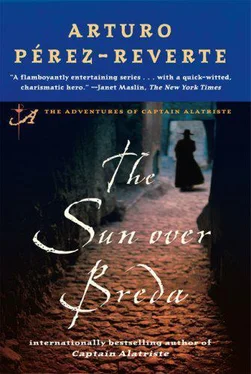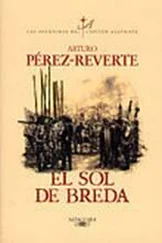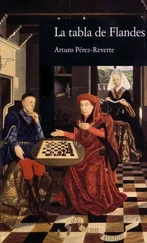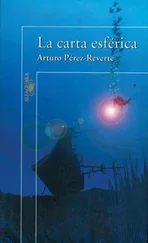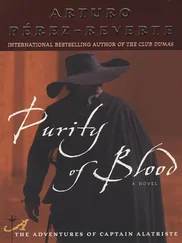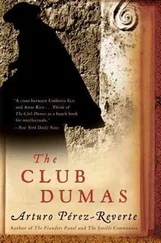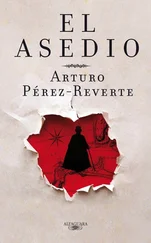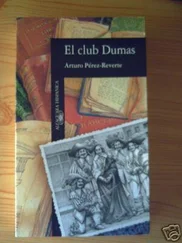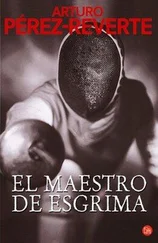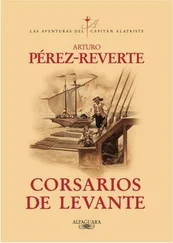Arturo Pérez-Reverte - The Sun Over Breda
Здесь есть возможность читать онлайн «Arturo Pérez-Reverte - The Sun Over Breda» весь текст электронной книги совершенно бесплатно (целиком полную версию без сокращений). В некоторых случаях можно слушать аудио, скачать через торрент в формате fb2 и присутствует краткое содержание. Жанр: Старинная литература, на английском языке. Описание произведения, (предисловие) а так же отзывы посетителей доступны на портале библиотеки ЛибКат.
- Название:The Sun Over Breda
- Автор:
- Жанр:
- Год:неизвестен
- ISBN:нет данных
- Рейтинг книги:5 / 5. Голосов: 1
-
Избранное:Добавить в избранное
- Отзывы:
-
Ваша оценка:
- 100
- 1
- 2
- 3
- 4
- 5
The Sun Over Breda: краткое содержание, описание и аннотация
Предлагаем к чтению аннотацию, описание, краткое содержание или предисловие (зависит от того, что написал сам автор книги «The Sun Over Breda»). Если вы не нашли необходимую информацию о книге — напишите в комментариях, мы постараемся отыскать её.
The Sun Over Breda — читать онлайн бесплатно полную книгу (весь текст) целиком
Ниже представлен текст книги, разбитый по страницам. Система сохранения места последней прочитанной страницы, позволяет с удобством читать онлайн бесплатно книгу «The Sun Over Breda», без необходимости каждый раз заново искать на чём Вы остановились. Поставьте закладку, и сможете в любой момент перейти на страницу, на которой закончили чтение.
Интервал:
Закладка:
Now masses of enemies were upon us, and Lieutenant Chacón was running up the small incline before us when a ball struck him in the back, and he dropped where he was. We could see his bearded face, the gray hair of a veteran soldier, and watched as his clumsy fingers reached for the pole of the standard he had lost as he fell. He succeeded in grasping it and was struggling to his feet when a second shot tumbled him face up. Our standard lay crumpled on the ground beside the corpse of the lieutenant who had fulfilled his duty so honorably. Suddenly Rivas leaped from behind the gabions and ran toward the standard. I have already told Your Mercies that Rivas was from Finisterre, which is like saying the very ends of the earth; he was, pardiez , the last man anyone would have imagined leaving the parapet to retrieve a flag that he could take or leave. But with Galicians one never knows, and there are always men who surprise you. Well, there went our good Rivas, as I was saying, and he was halfway down the incline before he was struck by several musket balls and rolled down the terreplein almost to the feet of don Pedro de la Daga and his officers, who were being battered without mercy by the wave of attackers. The six Germans performing their obligations without imagination or complication, as men do when they are well paid, were killed as God would have it, surrounding their colonel and selling their hides dear. The colonel had had time to buckle on his breastplate, which was the only reason he was still on his feet, though by now he had two or three serious wounds. The English kept coming, shouting, sure of their endeavor; the standard lying halfway down the slope merely fortified their daring, for a captured standard meant fame for the one who won it and shame for the one who lost it. That bit of checked blue-and-white cloth with a red band represented—in a sacrosanct tradition—the honor of Spain and of our lord and king.
“No quarter! No quarter!” the whoresons shouted.
Our fire had downed several of them, but by that point there was nothing that could save don Pedro de la Daga and his officers. One of them, unrecognizable because his face had been cut to ribbons, was trying to hold off the English so the colonel could escape. In all justice, I have to say that Jiñalasoga was faithful to himself to the end. Swatting away the officer who was tugging at his elbow and urging him to climb the hill, he left his sword in the body of one Englishman, blasted the face of another with his pistol, and then, neither ducking nor cringing—as arrogant on the road to hell as he had been in life—he gave himself to the blades of a pack of Englishmen who had recognized his rank and were competing for the spoils.
“No quarter!…No quarter!”
Only two of our officers were left alive, and they ran up the terreplein, taking advantage of the fact that the attackers were too busy feeding on the colonel. One died after a few steps, skewered by a pike. The other, the one with the badly cut face, staggered forward toward the standard, bent to pick it up, stood, and even managed to take three or four steps before he fell, riddled with pistol and musket balls. Again the standard was on the ground, but now no one was focusing on it; we were all too occupied spraying harquebus balls at the English, who were nearing the top of the slope above us, eager to add to the colonel’s body the trophy of our standard. As for me, I was still handing out powder and balls, the supply growing dangerously low. I used the intervals to load and fire the harquebus Rivas had left behind. I loaded it clumsily, for the weapon was enormous in my hands, and it kicked like a mule, almost dislocating my shoulder. Even so, I got off at least five or six shots. I would ram an ounce of lead into the muzzle, carefully fill the pan with powder, and place the cord in the serpentine, concentrating on keeping the pan closed as I blew on the cord, exactly as I had seen the captain and others do so many times. I had eyes only for the combat and ears only for the thunder of the powder whose acrid black smoke was burning my eyes, nostrils, and mouth. Angélica de Alquézar’s letter lay forgotten inside my doublet, next to my heart.
“If I get out of this,” Garrote growled as he hurried to reload his harquebus, “I will never come back to Flanders, not even for gold.”
In the meantime, the battle continued at the walls of the fort and on the dike below it. When he saw the men deserting Captain Fenice, who had died at the gate doing his duty with great honor and integrity, Sergeant-Major don Carlos Roma armed himself with a sword and buckler and jumped into the path of the fleeing soldiers, attempting to turn them back to the battle. He knew that the dike they had come along was narrow and that if he could slow the attackers, it would be possible to push them back. As they ran into each other, they would clog the road, and only those already there could fight. Thus, little by little, he was evening the battle on that front, and the Italians, now regrouped and with their courage renewed by their sergeant-major, were fighting with good heart, for men of that nation, when they have the will and good reason, know how to fight. They were driving the English away from the wall, halting the main attack.
Things were not going as well for us. A hundred English, in tight formation, were almost within reach of the terreplein, the fallen standard, and the gabions of the redoubt, hindered only by the significant damage our harquebusiers, spitting balls at them from less than twenty paces, continued to inflict.
“We’re running out of powder!” I warned.
It was true. We had enough for only two or three more charges for each man. Curro Garote, cursing like a galley slave, slid down behind the parapet, his arm disabled by a musket ball. Pablo Olivares took over the Malagüeño’s two remaining shots, and continued to fire until he had exhausted those two and his own. Of the others, Juan Cuesta, from Gijón, had been dead for some time, sprawled between some gabions, and Antonio Sánchez, a veteran soldier from Tordesillas, was soon to join him. Fulgencio Puche, from Murcia, dropped with his hands to his face, bleeding through his fingers like a stuck pig. The remaining men fired their last shots.
“This is the end,” said Pablo Olivares.
We looked at one another, undecided, hearing the cries of the English drawing closer up the slope. Their clamor was making me quake with terror, a bottomless despair. We had less time left than it takes to recite the Credo, and no options but the enemy or the swamp. Some men started drawing their swords.
“The standard,” said Alatriste.
Several looked at him as if they did not understand his words. Others, Copons first among them, went and stood by the captain.
“He’s right,” said Mendieta. “Better with the standard.”
I knew what he meant. Better out there with the standard, fighting around it, than here behind the gabions, cornered like rabbits. I no longer felt any fear, only a deep and ancient weariness, and a wish to finish this thing. I wanted to close my eyes and sleep for eternity. I noticed that the hair on my arms was standing on end as I reached back to unsheathe my dagger. Both hand and dagger were trembling, so I gripped it tightly. Alatriste saw me ready myself, and for a fraction of a second his gray-green eyes flashed with something that was both an apology and a smile. Then he bared his Toledo blade, threw off his hat and the belt with the twelve apostles, and without a word jumped up on the parapet.
“Spain!…Close in for Spain!” some yelled, following close behind.
“Not for Spain, no!” Garrote muttered, limping with his sword in his good hand. “My bollocks! Close in for my bollocks!”
I do not know how, but we survived. My recollections of the slope of the Terheyden redoubt are confused, just as they are for that hopeless assault. I know that we jumped to the top of the parapet, some quickly crossed themselves, and then, just as the nearest English were about to pick up our standard, we ran downhill like a pack of savage dogs, howling and brandishing our daggers and swords. They stopped short, terrorized by this unexpected aggression when they thought our resistance had been broken. They were still paralyzed, hands reaching out toward the staff of the flag, when we threw ourselves on them, killing at will. I fell upon the standard, clutching it in my arms, determined that no one would take it from me without first taking my life, and I rolled with it down the terreplein, over the bodies of a dead officer, Lieutenant Chacón, the good Rivas, and over the English that Alatriste and the others were slicing up as they descended the slope. We came with such momentum and ferocity—the strength of desperate men is that they do not expect salvation—that the English, demoralized by our assault and seeing the punishment they were taking, began to lose heart and fell back, tripping over one another. Then one turned his back, and others quickly followed suit. Captain Alatriste, Copons, the Olivares brothers, Garrote, and the others were red with enemy blood and blind from killing. Then, unexpectedly—exactly as I am telling you—the English began to run by the dozen, retreating, and our men were after them, wounding them from behind as they went on this way. They fought forward as far as the corpse of don Pedro de la Daga, then farther, leaving the ground behind them a slaughterhouse. I slipped and rolled down that bloody trail of butchered English with the standard held tightly in my arms, then followed, howling with all my might, yelling my despair, my rage, and the courage of the race of men and women who made me. As God is my witness, I was to know many more battles and combats, some as closely fought as this, but it is when I remember that day that I still burst out weeping like the boy I was, when I see myself barely fifteen years old, clutching that absurd piece of blue-and-white-checked linen, yelling and racing across the blood-soaked slope of the Terheyden redoubt. The day that Captain Alatriste looked for a good place to die, and I, along with his comrades, followed him through the midst of the English troops because we were all going to die one way or other and because we would have been ashamed to let him go alone.
Читать дальшеИнтервал:
Закладка:
Похожие книги на «The Sun Over Breda»
Представляем Вашему вниманию похожие книги на «The Sun Over Breda» списком для выбора. Мы отобрали схожую по названию и смыслу литературу в надежде предоставить читателям больше вариантов отыскать новые, интересные, ещё непрочитанные произведения.
Обсуждение, отзывы о книге «The Sun Over Breda» и просто собственные мнения читателей. Оставьте ваши комментарии, напишите, что Вы думаете о произведении, его смысле или главных героях. Укажите что конкретно понравилось, а что нет, и почему Вы так считаете.
